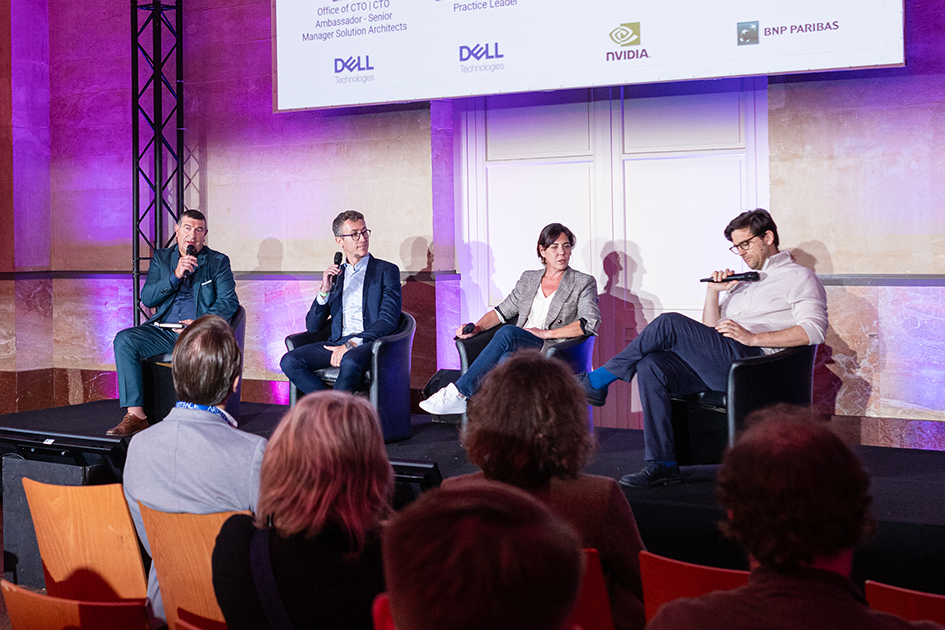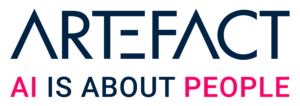AI for Finance Summit by Artefact - September 17th, 2024 - Paris
Key learnings from the panel discussion with Eric Bezille, Office of CTO – CTO Ambassador – Senior Manager Solution Architects at Dell Technologies, Marco Mengotto, EMEA Financial Services Practice Leader at Dell Technologies, Laetitia Faucon, FSO Lead France at Nvidia, and Andrea Mogini, Head of Language Analytics – Pace, at BNP Paribas.
AI and generative AI in finance
The panel explores the challenges and solutions for adopting AI in finance, featuring speakers from BNP Paribas, Dell Technologies, and NVIDIA. While AI has been present in finance for years, the rise of generative AI (GenAI) introduces new opportunities and challenges, such as natural language processing (NLP) and infrastructure demands.
NVIDIA’s role and market trends
NVIDIA, a major AI player, supports financial services with tools and open-source software. GenAI growth, spurred by tools like ChatGPT, has expanded interest globally. While the U.S. and China lead, Europe, especially France, is quickly catching up. AI is used across finance, from risk management to high-performance computing.
Dell’s perspective, AI adoption challenges
Dell emphasizes the complex nature of AI projects, involving multiple roles like business, data science, and IT. One major issue is data quality; poor data undermines AI model accuracy. IT infrastructure must also support seamless collaboration. Traditional IT models often slow AI projects due to governance and unrealistic expectations, leading to project failures.
BNP Paribas’ view, AI in retail banking
BNP Paribas states that most current AI value comes from structured data, not GenAI or NLP. Although these technologies will soon play a key role, their impact is still developing. The focus on GenAI is seen as excessive, BNP highlights the need to utilize various AI tools effectively. Smaller AI models are also emerging due to lower costs and scalability.
Product development and AI trends
GenAI speeds up proof-of-concept development but can hinder focus on scalable solutions. Developers are quick to show value but may lack strategies for long-term application. The shift is now from training models to evaluating their real-world use. High expectations for AI performance add pressure to meet ambitious goals.
Overcoming challenges and infrastructure needs
BNP Paribas faces hardware and software challenges for AI. Computing requirements are increasing, demanding infrastructure updates. On-premises AI also requires software optimization. Nvidia and Dell highlight the need for collaboration between IT, developers, and business units to support scaling. AI infrastructure should be holistic, integrating software, hardware, and strategy.
AI factories, Solutions for sustainable AI development
AI factories provide integrated infrastructure, software, data, and collaboration for various roles in an organization. This approach supports sustainable, flexible, and adaptable AI systems. Emerging hardware like GPUs, language processing units (LPUs), and neural processing units (NPUs) require open, modular systems ready to evolve with AI trends.
BNP Paribas, Navigating AI implementation
BNP Paribas partners with Dell, NVIDIA, and others for AI model training and optimization. The focus is on value generation rather than technology alone, ensuring that AI aligns with business needs and effectively serves customers.
Conclusion
The panel stresses an AI strategy focused on value creation, using scalable infrastructure to stay current with technology. Being proactive, informed, and ready to implement an AI factory approach can help finance companies maximize AI benefits while adapting to future trends.

 BLOG
BLOG



